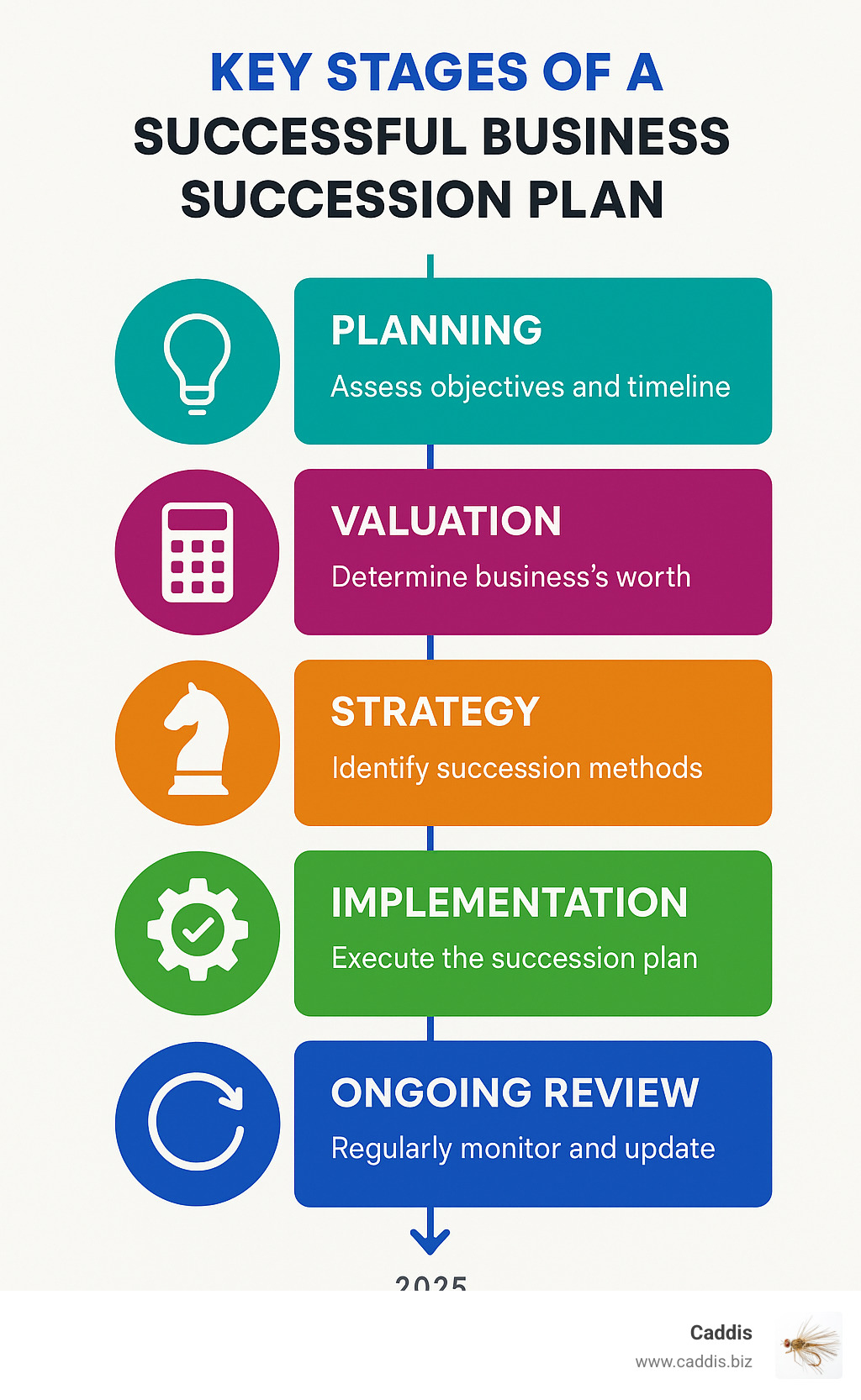Navigating Your Future with Business Succession Planning Consulting
What is Business Succession Planning Consulting?
- Business succession planning consulting helps owners prepare their company for a future transition of leadership or ownership.
- Consultants guide you through complex choices like selling the business, passing it to family, or enabling a management buyout.
- Their goal is to ensure business continuity, maximize its value, and secure your financial future and legacy.
- This expertise is crucial, as 79% of business owners lack a detailed plan, and many businesses fail to sell when put on the market.
Ensuring your business thrives long after you’re gone requires a solid plan for its next chapter. This is where business succession planning consulting becomes essential, guiding you through a sale, family handover, or management buyout. Yet, 79% of owners lack a detailed plan, and a staggering 70-80% of businesses listed for sale never find a buyer. Without a clear roadmap, your legacy is at risk. This guide explains why succession planning is crucial and how expert consultants can ensure a smooth, successful transition.
Jeff Mount is an expert in strategic business growth, helping leaders steer complex challenges like business succession planning consulting to ensure long-term viability.

Basic business succession planning consulting glossary:
The Succession Challenge: Why Most Businesses Aren’t Prepared
Business owners excel at daily problem-solving but often freeze when planning their own exit. The statistics are sobering: 79% of owners lack a detailed succession plan, and 70-80% of businesses put on the market never sell. This inaction stems from a combination of procrastination, a lack of understanding of the process’s complexity, and emotional barriers to letting go. Family dynamics further complicate matters, as only 30% of family businesses successfully transition to the second generation, despite their potential to outperform other companies. Many owners also underestimate the legal and financial coordination required and hold unrealistic expectations about their business’s value, a critical aspect detailed in companies valuation.
The High Stakes of Inaction
Putting off succession planning isn’t just procrastination—it’s a gamble with everything you’ve built. The consequences can be devastating:
- Business continuity risk: Without a plan, an owner’s sudden departure causes chaos, halting operations and panicking clients and employees.
- Decreased business value: A lack of planning is a red flag for buyers, who won’t pay top dollar for uncertainty. Conversely, businesses that plan often see their value increase.
- Employee uncertainty: Key employees won’t stay with a company whose future is in doubt, taking valuable knowledge with them.
- Tax consequences: A poorly structured transition can trigger massive, avoidable tax bills.
- Failed transitions: Without preparation, the 70-80% failure rate for business sales puts your vision and financial security at risk.
Common Problems: Emotional and Family Dynamics
Business succession planning consulting is especially valuable for navigating the emotional minefield of a transition. The fairness versus equality dilemma, communication breakdowns, generational differences, and unspoken expectations often create conflict in family businesses.
A neutral third-party consultant is invaluable here. They provide objective perspectives and facilitate difficult conversations, helping with conflict resolution by ensuring all voices are heard while focusing on what’s best for both the family and the business. As we always say, “there’s no business gain worth a family loss.” You can’t run a business like a family, and you can’t run a family like a business—but you can find a path that honors both.
The Strategic Advantage of Business Succession Planning Consulting
While it’s tempting to handle succession planning yourself, a business succession planning consulting firm offers advantages that are nearly impossible to replicate on your own. A consultant provides crucial objectivity, seeing your business without emotional attachment. They bring specialized expertise, like our deep knowledge of sales strategies at Caddis, which helps increase business value before the transition. Consultants also ensure accountability, keeping the process on track, and follow a proven process to address every critical aspect. Their goal is maximizing value—not just the sale price, but also your legacy, business continuity, and financial freedom. Our understanding of business growth tracking software becomes crucial during this process.

What a Succession Planning Consultant Does for You
Think of a consultant as a strategic partner guiding you through a critical life transition. We work alongside you to:
- Clarify Goals: We help you articulate what you truly want to accomplish, whether it’s maximizing financial return, preserving company culture, or creating a family legacy.
- Value Your Business: We conduct a thorough, realistic valuation of your business, which becomes the foundation for all planning. Learn more about our business valuation company services.
- Identify & Develop Successors: We help you identify the right path—family, internal, or external—and then develop your chosen successors’ skills through training and mentoring.
- Model Finances: We create detailed projections for various scenarios and work with tax professionals on tax minimization strategies.
- Manage the Transition: We orchestrate the handover, ensuring a seamless transfer of responsibilities, client relationships, and institutional knowledge.
- Communicate with Stakeholders: We help you craft communication plans to maintain trust with employees, clients, and other key partners throughout the process.
The Typical Consulting Process: A Roadmap to Your Future
Our business succession planning consulting follows a proven five-phase process:
- Phase 1: Findy and Goal Setting: We conduct deep interviews with you, key managers, and family to understand your personal and business goals.
- Phase 2: Analysis and Valuation: We perform a comprehensive business valuation and assess your talent pipeline, leadership, and culture to identify strengths and weaknesses.
- Phase 3: Strategy Development and Roadmap Creation: We develop a customized succession strategy, explore transition options, and create a detailed roadmap with action steps and timelines.
- Phase 4: Implementation and Training: We help execute the plan, whether it involves training successors, preparing the business for sale, or drafting legal agreements.
- Phase 5: Monitoring and Adjustment: We provide ongoing support to monitor progress and refine the plan as circumstances, markets, or goals change. Understanding the hard truth about winning with KPIs is critical here.
Finding the Right Expert: What Qualifications Matter in business succession planning consulting?
Choosing the right partner is critical. Look for:
- Credentials: Recognized certifications like Certified Exit Planning Advisor (CEPA), CPA, or CFA indicate serious expertise.
- Industry Experience: A consultant who understands your specific industry, like our experience with financial advisors and small businesses, is invaluable.
- Cross-Disciplinary Teams: The best consultants work with legal, tax, and wealth management experts for a holistic approach.
- Proven Track Records: Ask for case studies and client references to verify their success in areas like sales management.
- Emotional Intelligence: The best advisors are empathetic and skilled in conflict management, especially in family business situations.
Key Succession Strategies and Their Impact on Business Value
Choosing the right succession path is a custom fit, not a one-size-fits-all decision. The path you choose directly impacts your business’s long-term viability, growth potential, and your financial outcome. Business succession planning consulting experts help you see all the angles, taking a custom approach to your specific situation. At Caddis, we’ve seen how strategic planning can dramatically increase business valuation, especially for financial advisors and small businesses.

Let’s explore the three main succession paths and how each one can impact your business’s value and your financial goals.
Path 1: Family Transition
Passing your life’s work to family is about preserving legacy. This requires grooming the next generation through mentorship and real responsibility, not just a title. While this path maintains company culture and values, managing family dynamics can be emotionally challenging. Establishing clear governance and communication is essential. Tax-efficient transfers, through strategies like gifting or installment sales, are also crucial to maximize the wealth passed on.
Path 2: Management or Employee Buyout (MBO/EBO)
A management or employee buyout (MBO/EBO) is a great way of rewarding key employees who helped build the business. This path helps maintain company culture and continuity since the new owners already know the operations. The primary challenge is often financing, as the team may lack the capital to buy the business. Creative deal structuring, such as seller financing or helping secure loans, becomes essential. In these cases, coaching for financial advisors to boost sales can be vital to ensure new owners can grow revenue to support the purchase.
Path 3: Sale to an Outside Buyer
When maximizing sale price is the primary goal, selling to an outside buyer is often the best path. This route typically yields the highest financial return but offers less control over the business’s future. The key is identifying strategic buyers who will pay a premium because your business offers them unique value. Preparing the business for market by cleaning up financials and operations is critical. Be prepared for an intense due diligence process and maintain strict confidentiality to avoid disrupting your business. Our business strategy insights can help position your company for maximum value.
Navigating the Process: Avoiding Pitfalls and Planning for Contingencies
Even with expert guidance, succession planning has potential pitfalls. An experienced business succession planning consulting team helps you spot warning signs and build safeguards. Proactive planning and risk management are your insurance policy for business continuity, especially when facing unexpected events where resources like IRS Publication 559 for survivors and executors become critical.
Common Pitfalls to Avoid in Your Succession Plan
Learning from others’ experiences can save you from these common and costly errors:
- Starting too late: Most companies know succession matters, but few have a plan. Starting early provides more options and time to develop successors properly.
- Poor communication: Keeping family, employees, and stakeholders in the dark breeds resentment and speculation. Transparency is crucial, even on sensitive topics.
- No successor development: Simply naming a successor isn’t enough. They need dedicated training, mentorship, and leadership opportunities to be prepared.
- Ignoring tax implications: Treating tax planning as an afterthought can lead to significant, avoidable financial losses.
- Unrealistic valuation: An inflated idea of your business’s worth can scare off buyers and lead to frustrating, failed negotiations.
- Neglecting the emotional side: Succession is about people, relationships, and identity. Ignoring these feelings can derail the entire process.
Succession Planning vs. Exit Planning: A Critical Distinction
Many owners confuse succession planning with exit planning. While related, they have different focuses. Succession planning is about business continuity and legacy, asking, “How will the business thrive?” Exit planning is about the owner’s departure, asking, “How will I exit with maximum value?” The best business succession planning consulting integrates both, creating a roadmap that aligns your personal financial goals with the company’s future.
| Feature | Succession Planning | Exit Planning |
|---|---|---|
| Primary Focus | Business continuity, future leadership, legacy | Owner’s personal financial goals and departure |
| Key Question | Who will lead the business, and how will it thrive? | How will the owner exit, and what will they receive? |
| Timeline | Often ongoing, long-term (5-10+ years) | Specific event-driven, medium-term (2-5 years) |
| Beneficiary | The business, employees, future owners, community | The owner and their family |
| Main Objective | Ensure smooth transition, preserve culture, develop talent | Maximize owner’s financial gain, achieve personal freedom |
| Typical Outcome | Internal promotion, family transfer, management buyout | Sale to outside buyer, recapitalization, liquidation |
Preparing for the Unexpected: The Emergency Succession Plan
An emergency succession plan addresses what happens if you or another key leader is suddenly unable to work. It’s a responsible step to protect your family, employees, and customers. This plan should include:
- Identifying critical roles and who can step in.
- Cross-training employees on essential tasks to build redundancy.
- Documenting key processes, passwords, and contacts so the business can run without you.
- Establishing a clear chain of command to prevent chaos in a crisis.
- Creating buy-sell agreements for businesses with multiple owners to dictate what happens to a departing owner’s share.
Frequently Asked Questions about Business Succession Planning Consulting
It’s a big decision, and you likely have questions. Here are answers to the most common ones we hear from business owners.
How long does the succession planning process take?
There’s no single timeline, as it depends on your business’s complexity and goals. A comprehensive plan typically takes 12 to 24 months to implement. However, a family transition involving grooming the next generation can take 5-10 years. The key is to view succession planning as an ongoing process, not a one-time project. We use a phased approach to deliver clarity and progress along the way, making adjustments as your business and life evolve.
How much does business succession planning consulting cost?
The cost of business succession planning consulting varies with the scope of work. Fees can be structured as project-based for defined tasks like a valuation, retainer-based for ongoing guidance, or value-based, tied to the value created (e.g., tax savings). While it is an investment, the cost of not planning—forced sales, family disputes, or massive tax bills—is almost always far greater than the cost of professional guidance.
When is the right time to start succession planning?
Ideally, you should start 5-10 years before your desired transition. This provides ample time to explore options, develop successors, improve business value, and implement complex tax strategies. However, it’s never too late to start. Even if you plan to transition in the next year, beginning the process now is far better than waiting for a crisis. As we often say, your company must grow right now, and that includes growing toward a successful transition. The best time to start is now.
Secure Your Legacy and Maximize Your Business’s Value
Your business is the embodiment of your vision and hard work. It deserves a future as bright as the legacy you’ve created. Yet, with 79% of owners lacking a plan and 70-80% of businesses failing to sell, leaving that future to chance is a significant risk.
Proactive business succession planning consulting is one of the most powerful tools for creating value. It puts you in control, allowing you to make strategic decisions that maximize your business’s worth and secure your financial future. Whether you choose a family transition, management buyout, or external sale, expert guidance helps you steer the complexities with confidence.
At Caddis, based in Fairfield, Connecticut, we specialize in helping financial advisors and small businesses not just plan for succession, but actively increase their business valuation in the process. Our unique approach combines customized sales strategies with the proven SalesQB framework to position your business for maximum value.
Your legacy is too important to leave to chance. The peace of mind from a secure plan is priceless.
Ready to turn succession planning into a strategic advantage? Partner with a Fractional Chief Revenue Officer to prepare your business for its next chapter. The best time to plan for tomorrow is today.



